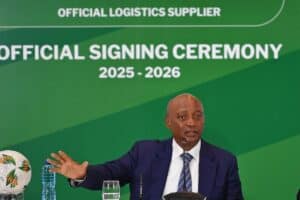He brought back the credibility and confidence for which society was looking, said professor Dirk Kotze, from the faculty of political science at Unisa.

A political expert, a risk boffin and a security analyst were yesterday unanimous on the effect of President Cyril Ramaphosa’s announcement to unveil a package of measures in response to the spreading coronavirus.
It was, they agreed, a mark of good leadership.
Ramaphosa’s much-anticipated evening address was twice delayed – but for professor Dirk Kotze, from the faculty of political science at the University of South Africa, University of Stellenbosch lecturer in disaster and risk studies Trish Zwieg and Dr Johan Burger of the Institute for Security Studies, the wait was worth it.
“I would rate the speech by the president very high – a mark of good leadership,” said Kotze. “He brought back the credibility and confidence for which society was looking.
“Even if the measures are going to be hard and hurtful, the president realised that something had to be done – what United States President Donald Trump and the United Kingdom’s Boris Johnson could not do.
“He may have taken his time before making the announcement, but what came across vividly was that we have a president who talks after making widespread consultations to gain the support of key stakeholders and other interest groups.
“South Africans should get used to his style of being all-inclusive and not self-imposing.”
Zwieg concurred with Kotze.
“This showed effective risk management at its best.
“I have two children in Europe – one in Ireland and another in the UK, but none of the countries in which they live have introduced a lockdown, despite deaths from the coronavirus.”
Burger rated Ramaphosa “very highly for his courageous decision”.
“All of the measures the president has announced, are quite acceptable and desirable, taking into account that he had very little choice,” said Burger. “I rate him very highly for being courageous, in having come up with this kind of lockdown, involving the military.”
Burger said a countrywide military deployment was “the first for a post-democratic South Africa”.
“In the past we have seen some soldiers backing up the police in international sporting events and in gang-related crime hot-spots of the Western Cape, with a very limited role.
“This kind of deployment should be regarded as a peace-keeping role within the country,” said Burger.
He expected soldiers to assist police “under immense pressure in fighting crime”.
“The army will do a lot in helping to enforce national disaster regulations, especially in problem areas where some members of the public are likely to show contempt for the law.
“To ordinary law-abiding citizens, the military will have a reassuring effect – not something to frighten the citizenry.
“The visibility and presence of soldiers in uniform, in problem areas can have a deterring effect,” Burger added.
For more news your way, download The Citizen’s app for iOS and Android.
Support Local Journalism
Add The Citizen as a Preferred Source on Google and follow us on Google News to see more of our trusted reporting in Google News and Top Stories.






